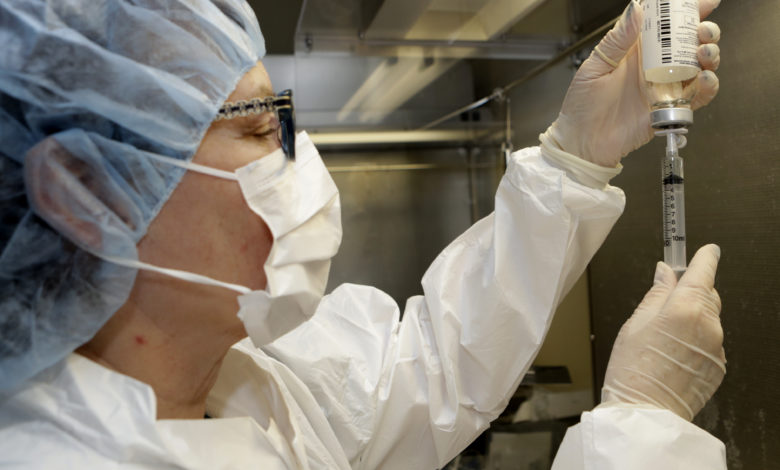Missouri doctors warn the “Tripledemic” is taking its toll on children’s hospitals across the state

JEFFERSON CITY, Mo. — The “tripledemic” is taking a toll on Missouri’s health care system, and the state’s epidemiologist is concerned we could still be weeks away before cases decline.
Missouri’s top disease doctor, Dr. George Turabelidze, said you can contract RSV, the respiratory syncytial virus, no matter your age, it just affects everyone differently. He said it has to do with your immunity, and after almost three years of dealing with a pandemic, some immune systems just haven’t had enough exposure.
“Once we opened up as a society, they were exposed to this virus and this is the prime age, kids under three is the prime age for RSV,” Turabelidze said. “Those children who were born nearly three years ago because of mitigation, social distancing and masking, some of them have never been exposed to RSV.”
Respiratory syncytial virus (RSV) is a common airborne virus that causes mild, cold-like symptoms, such as fever, cough, congestion, runny nose, and sneezing. Infants can also experience fussiness and poor feeding. The virus can show more severe symptoms like grunting, wheezing, and shortness of breath.
It’s a triple threat: RSV, COVID-19 and influenza. Missouri hospitals are dealing with the influx of “tripledemic” patients. Dave Dillion with the Missouri Hospital Association (MHA) said it’s the children’s hospitals who are really feeling the brunt.
“In children’s hospitals, you just have a series of different skills in dealing with adolescents, with babies and so you can’t just easily find folks with a lot of experience,” Dillon said.
Due to the large number of RSV cases, MHA host weekly calls with children’s hospitals across the state, so they can provide capacity, equipment and staffing updates.
“There is a lot of capacity built into traditional, acute care hospitals in the state and there’s a lot less availability in children’s hospitals,” Dillon said. “These children’s hospitals in Missouri only have so much space.”
Some parts of the state have more care for pediatric patient than others, causing many to be transferred.
“If you’re looking at Kansas City or St. Louis, they may be getting patients as far away as Nebraska or Oklahoma,” Dillon said. “St. Louis has multiple hospitals that are specific to children’s care or have children’s hospitals associated with them. Kansas and Kansas City have less. What we’re seeing on that side of the state is their ability to manage through this is a little more stretched.”
Dillon said the biggest problem for health care facilities is staff. Between the skill set needed to take care of pediatric patients is also difficult, but hiring contracted staff is challenging because other parts of the country are also seeing the same increase in cases.
“There isn’t a linear path to making this a lot easier,” Dillon said. “The staffing issue isn’t easily fixable because this is highly specialized. When we need to expand, having access to the staff to do the bedside care is truly the pinch point.”
Six weeks into flu season, the Department of Health and Senior Services (DHSS) is reporting 4,016 laboratory-positive influenza cases. Last year, at this time, there were 243 lab-confirmed cases. Compared to pre-pandemic times, during the first week of November 2018, there were 983 cases.
“I could probably say with a very good probability that we are in just the beginning of the flu season, so from here on, we will only see increasing cases for the next few weeks,” Turabelidze said.
He also expects a new wave of COVID cases to hit Missouri in the coming weeks.
“Just because of the change in the variants that we are seeing circulating as well as the season,” Turabelidze said. “The vaccine will be helpful in terms of avoiding severe disease, avoiding hospitalization and, of course, the worse outcomes. You still may develop infection, but you are much less likely to end up in a hospital.”
While healthy adults contract RSV, they might only have a runny nose, but for those older than 65, it could be a serious illness.
“It can cause pneumonia and require hospital admission,” Turabelidze said. “Overall, RSV activity is high across all age groups, but of course particularly those under five years of age and especially under one years old.”
Turabelidze said RSV cases could finally be reaching a peak in Missouri, but it’s still too early to tell.
“I’m saying probably because we see some signs of stabilization, but we don’t know if this stabilization is temporary or if we will go up from here again or if we will start to decline,” Turabelidze said.
Until March 2023, Missourians can visit one of 15 testing sites and receive a single nasal swab test to check for all three viruses. Patients of all ages can be tested. The health department said additional testing locations will be added.
While RSV is not a reportable condition to DHSS, the Centers for Disease Control and Prevention (CDC) tracks state-level trends and data shows an increase in Missouri.
Flu and COVID-19 have similar symptoms, including cough, shortness of breath or difficulty breathing, fatigue, sore threat, stuffy or runny nose, muscle pain or body aches, and headaches.



